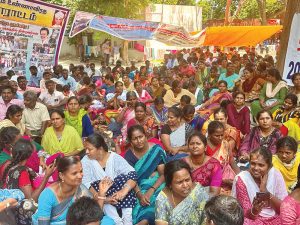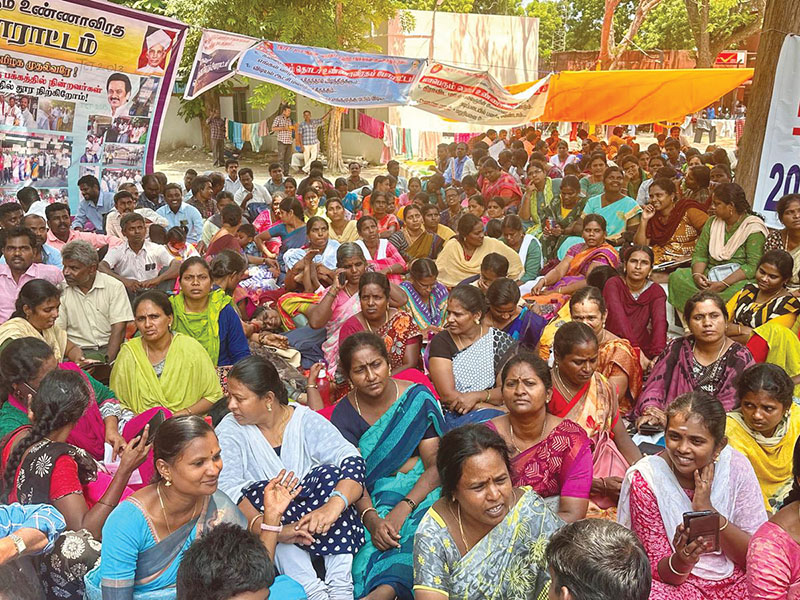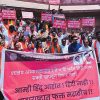Tamil Nadu: Indefensible inequity
Shivani Chaturvedi (Chennai)

Chennai part-time teachers protest
Although tamil nadu (pop.77 million) has allocated a massive aggregate sum of Rs.55,261 crore for education in its 2025-26 budget — the highest-ever allocation for the ministry cf. Rs.44,042 crore in the previous year — thousands of school teachers across the state are in part-time employment, not entitled to the generous pay scales stipulated by Pay Commissions established from time to time by the Central government, and followed by state governments.
Despite decades of service in government schools, part-time ‘volunteer teachers’ are undocumented, underpaid, and denied permanent status. Last month over 5,000 part-time teachers statewide protested, staging sit-ins outside district education offices and fasting at Chennai’s Directorate of Public Instruction complex, urging the state government to issue permanent appointment letters to them.
The origins of the issue trace back to 2012, when under the Samagra Shiksha Abhiyan (the Centre’s integrated scheme for school education covering the entire gamut from primary to class XII), the TN government appointed 16,000 part-time/volunteer teachers to teach ‘special subjects’ such as music, art, tailoring, computers, and physical education. These teachers were hired with a consolidated pay package of Rs.5,000 per month, which was gradually raised to Rs.10,000 in 2021 and Rs.12,500 in 2024. Against this, the basic salary of a permanent primary school teacher appointed by the state government is Rs.35,400, which with allowances is Rs.40,000-50,000 per month. With seven-12 years’ experience, a permanent government primary school teacher in Tamil Nadu could earn Rs.4-5 lakh per year (Rs.35,000-41,000 per month).
On the other hand, an estimated 11,000 volunteer teachers, several of whom have completed over 12-14 years in service, are teaching in Tamil Nadu’s government schools earning Rs.12,500 per month, and are officially classified as “part-time,” which also deprives them of pension, medical benefits and employment stability.
Tamil Nadu hosts 37,211 government-run and 12,631 government-aided schools, serving lakhs of students. In a substantial number of these schools — particularly in rural belts — part-time teachers fill essential gaps in teaching non-core subjects. Yet, official recognition of their valuable service remains unfulfilled. Wasteful government expenditure especially high establishment costs, unmerited middle class subsidies and vote-catching consumption freebies resulting in government budget deficits as also low priority accorded to public education, ensure volunteer teachers suffer continuous inequity.
In its 2021 election manifesto, the incumbent DMK party had promised to regularise part-time teachers and extend health coverage to part-time staff. However, that commitment remains unfulfilled, even as government proclaims that education budgets have touched record highs.
Comments M.J. John Arokia Prabhu, Vice President of the Tamil Nadu Private Schools Association and head of the legal team of the Delhi-based National Independent Schools Alliance (NISA): “There is already a surplus of 3,800 permanent teachers in Tamil Nadu’s government schools. Realistically, there’s no need to employ part-time teachers. But unionised permanent teachers are difficult to re-deploy. Therefore part-time teachers are recruited to fill teacher shortages plus do election, census and other duties. With the legislative assembly election due next year, part-time teachers have become vocal about their justified demand for pay parity,” says Prabhu.
Throughout July, volunteer teachers initiated statewide, non-violent protests. Demonstrations included hunger strikes in Chennai and Coimbatore, black badge protests in over 15 districts, candlelight vigils outside block education offices, and petitions submitted to the chief minister’s grievance cell.
In schools where one or two part-time teachers are the only providers of training in subjects like tailoring, computers, or arts, their agitation has adversely affected students’ morale and future employment prospects.
“With supplementary and vocational education becoming increasingly important, school dropout rates may rise due to reduced curriculum variety. Public faith in government schools already shaken by issues like delayed RTE admissions, has taken another hit. Moreover the state government is likely to have to answer writ petitions filed under Article 14 (Right to Equality) and Article 21 (Right to Life with Dignity),” warns Chennai-based educationist Dr. S. Somasundaram.
Quite clearly the false division of teacher-educators into a permanent and part-time/volunteer binary is morally and ethically indefensible. Even if volunteer teachers are assigned non-core subjects — a doubtful proposition — and teach only vocational and life skill subjects, these subjects are becoming increasingly important in K-12 curriculums. Justice and equity demands that the Tamil Nadu government realigns its expenditure budget priorities to cut the state’s temporary teachers a fair deal and provide pay parity. Such open and continuous vocational discrimination is not in the public interest and sets a very bad example for school students.
Also Read: Tamil Nadu: Convenient opportunity
















Add comment